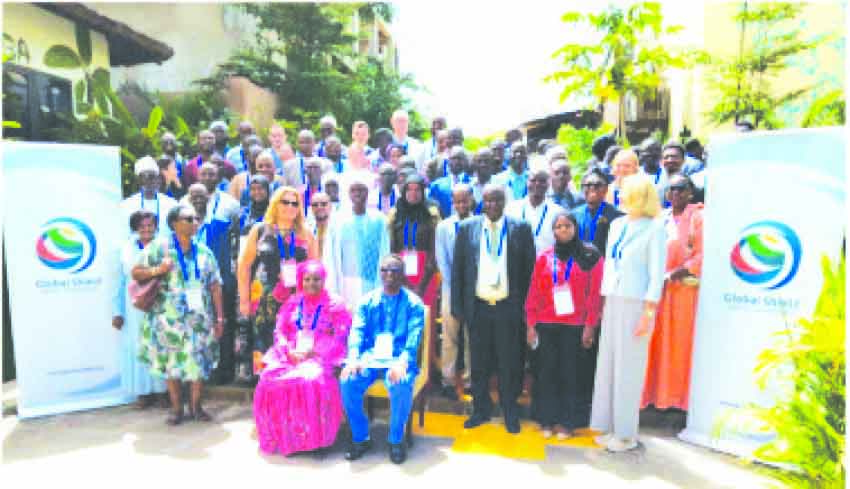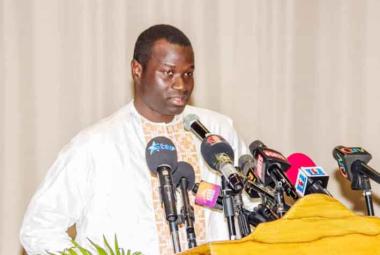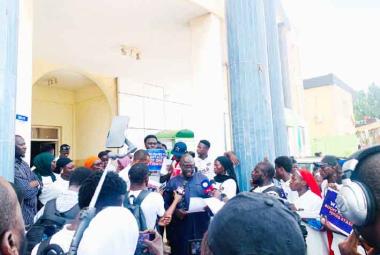By Kumba Leigh
The Gambia Government, in collaboration with the Global Shield recently organised a two-day forum to discuss the disaster risks mitigation action plan including to address climate risks, and the economies needed to withstand the growing threats posed by climate change. During the opening ceremony, Dr Astrid Zwick, co-Director, Global Shield Secretariat, talked about the complex challenges of climate risks. She opined that with well-established risk finance strategies, recoveries can be done significantly faster and more effectively after disasters. Thus, she said, the idea is to change the paradigm from crisis to risk management. In accordance with the loss and damage funding arrangements, she assured that they will always intervene to support the setup and operation of the new ‘Loss and Damage Fund’ by providing standardised processes, risk assessments, and shared learning for the relevant stakeholders.
Dr Zwick affirmed that The Gambia has already demonstrated leadership in climate and disaster risk financing and as a co-chair of the highest governing body of the ‘Insu-Resilience Global Partnership, a key precursor to their current efforts, it will be a shared passion in the fight against climate risks. She also acknowledged that The Gambia is showing strong progress in establishing climate and disaster risk management policies, and several key initiatives. However, the director stressed that one significant area that needs reform is global disaster relief and insurance systems, with a focus on creating solutions like insurance premium support that reflects a country’s development levels.
“We know disasters don’t wait; they strike with little warning, and when this happens, the time to act is often too late. Therefore, at Global Shield, we prioritise having mechanisms in place before disasters strike,” she said. Executive Director, National Disaster Management Agency, Sanna Dahaba said The Gambia is one of the first countries to have taken up a transformative initiative to protect its people by pursuing disaster risk management financing, and signing the establishment agreement of the AU specialised agency, ratifying the establishment treaty in May 2016, as well as being the country to pioneer the Africa Disaster Risk Finance Initiative. Mr Dahaba acknowledged that the Global Shield Programme is of great importance to The Gambia, “because it will help provide efficient solutions to dealing with extreme climate events; such as drought and floods”.
He expressed delight at Gambia’s commitment to addressing climate risks and DFF, especially insurance, adding that the new model innovation funding is consistent with their new Disaster Risk Management Policy 2024-2034, and the National Development Plan. He went on: “Gambia Government will build on what currently exists to make the country better prepared and respond to weather-related disasters in leadership of all Disaster Management Policy, outlining vision and agenda for disaster risk reduction along with a set of priority actions to guide the strategies.” The NDMA has through the ADRiFi and WACCa begun the development of a Disaster Risk Financing Strategy and Regulation to build a culture of safety and resilience through capacity development. Their engagement with ADRiFi and ARC has brought to light the main challenges as product review, strategy, regulation awareness and understanding of insurance products, inadequate infrastructure, and premium payments.
Madam Mirande Sende, Country Director, World Food Programme (WFP) referenced the NDMA’s latest report that 3,300 people are currently affected by floods across the country. She said at the global level, WFP, Global Shield and the World Bank are collaborating to maximise the impact of climate and disaster risk finance solutions by linking them to shocks responses, social protection programmes to increase the wellbeing of the vulnerable group. She said at country level, the Global Shield is aligning with WFP’s strategic plan of 2024-2028 to provide support of the most vulnerable groups’ basic food needs and nutrition. Martina Bock de Oliveira, Representative of the Embassy of the Federal Republic of Germany in Banjul, applauded the initiative and assured of German Embassy’s commitment to support. She said the significant damages caused by climate change in the world require urgent action to protect vulnerable people and countries by providing more finance for addressing climate related loss and damage. She recognised that The Gambia is among the countries that are regularly affected by climate change disturbances.
Rohey John Manjang, Environment Minister, reaffirmed that Gambia is increasingly affected by climate risks such as windstorm, drought, and floods, and that every two years such destructive disasters occur due to geographical location, rising temperatures, sea-level-rise, coastal erosion and salt water intrusion. She warned that these climate change challenges threaten not only the ecosystem but also fisheries, seaport and the tourism sector. However, she assured that there are strategic plans in place to addressing this menace; including Strategic Plans on Climate Change Resilience, National Climate Change Policy, The Gambia 2050 Climate Vision, and Long-term Climate Neutral Development Strategy 2050.
Representing the finance minster, Professor Pierre Gomez, Minister of Higher Education, Research Science and Technology, said climate advocates should build a short term climate resilience strategies, because climate change issues are realities confronting The Gambia. This, he said, is clearly seen in the agricultural sector and the economy. “There is the need for The Gambia to increase financial protection for affected farmers through programmes including the Africa Risk Financing Initiative,” the minister recommended.







